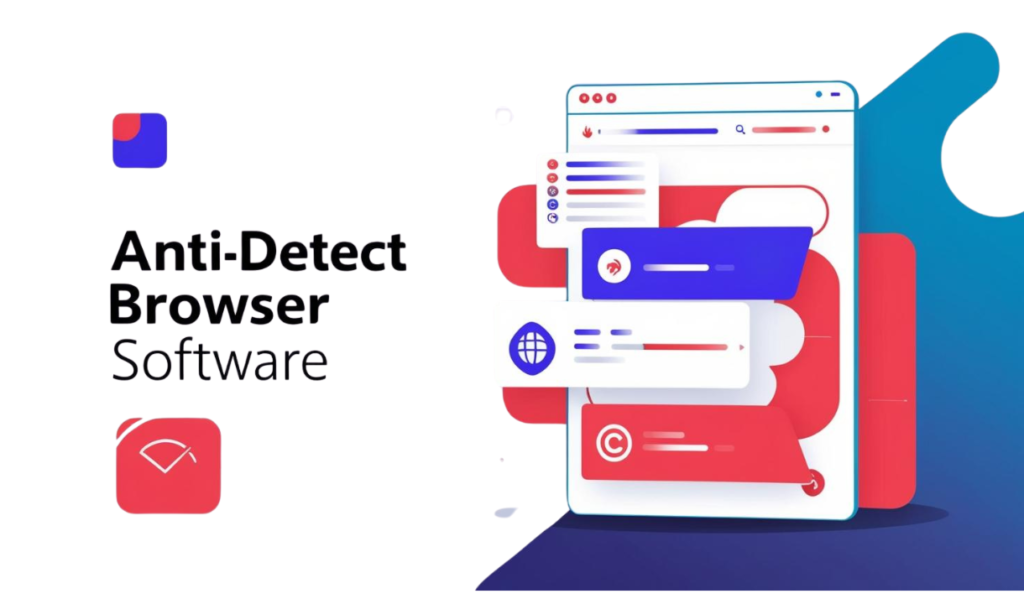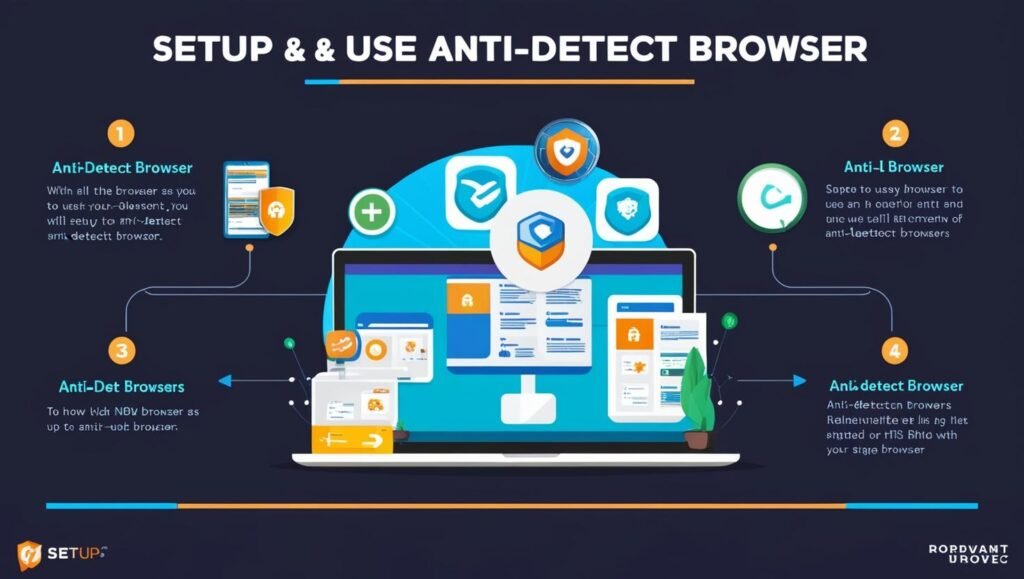Top Anti-Detect Browsers for E-Commerce, Data Scraping & Privacy
Anti-detect browsers are revolutionizing how we approach online commerce, Data Scraping & Gathering Information, and Privacy. These tools offer something indispensable for digital marketers seeking new levels of efficiency, SEO specialists aiming to overcome obstacles like search engine scrutiny, and privacy advocates wanting to protect their identities online.
This guide explores the world of anti-detect browsers, analyzing some of the most popular ones on the market, their features, and use cases. By the end, you’ll know how to choose the best one for your needs and how to set it up.
What Are Anti-Detect Browsers?

An anti-detect browser is a tool designed to conceal or modify your online digital footprint, making it difficult for websites to track your activities. It achieves this by creating separate browser profiles, each with its unique digital fingerprints. Unlike standard browsers, an anti-detect browser can simulate different devices, operating systems, languages, time zones, and various metadata attributes.
How They Work
Anti-detect browsers function by preventing browser fingerprinting, a common tracking method. They enable users to alter various parameters such as:
- User Agent (to simulate a different device or browser).
- Geolocation (to appear from a specific location).
- WebGL and WebRTC (to prevent data leaks).
- Cookies & Cache (to isolate browsing sessions).
This makes them powerful tools for activities like multi-accounting, marketing, and even online security.
Why They’re Useful
For:
- E-Commerce—These browsers are particularly beneficial for e-Commerce businesses for several reasons:
1. Preventing Account Bans or Restrictions
Many eCommerce platforms (like Amazon, eBay, Walmart, and others) track user activities through browser fingerprints, including information like your IP address, device type, screen resolution, time zone, and other identifying characteristics. If the platform detects unusual behavior or multiple accounts accessing from the same fingerprint, it may flag the accounts, leading to bans or restrictions.
2. Managing Multiple Accounts
- Create and manage multiple accounts without being flagged.
- Simulate different devices, browsers, or locations, ensuring the platform sees each account as a unique user.
3. Bypassing Geolocation Restrictions
An anti-detect browser can mask or alter your location
- SEO Specialists—to safely track competitors, conduct SERP analysis, and simulate search results from multiple locations.
- Digital Marketers—to manage several ad accounts without triggering platform bans.
- Privacy Advocates—to browse anonymously and securely protect their identity.
Below, we look at some of the most notable anti-detect browsers available today.
In-Depth Analysis of Anti-Detect Browsers
1. Undetectable.io
- Features:
- Manages unlimited accounts efficiently with unique browser profiles.
- Offers advanced proxy management and fingerprint substitution tools.
- Mass profile creation is enabled through automation.
- User Experience:
- Intuitive multi-account management tools with drag-and-drop functionality.
- Supports Windows 10 & Windows 11 and macOS.
- Pricing:
- Starts at $49/month with unlimited local profiles.
- Pros/Cons:
- Pros:
- Excellent fingerprint management.
- Local profiles, improving performance.
- Cons:
- Limited cloud backups for profiles could be improved.
- Pros:
- Use Cases:
- Social media marketers managing multiple Facebook and Instagram accounts.
- Dropshipping businesses with multiple e-commerce storefronts.
2. Dolphin Anty
- Features:
- Specializes in affiliate marketing and e-commerce.
- Automation of repetitive tasks using scripts.
- Offers synchronized actions across multiple profiles.
- User Experience:
- Beginner-friendly interface with tags and statuses for easy navigation.
- Compatible with Windows, macOS, and Linux.
- Pricing:
- The trial includes 10 profiles; premium plans start at $3/day.
- Pros/Cons:
- Pros:
- Great for team collaboration.
- Outstanding support and API documentation.
- Cons:
- Limited advanced setup options compared to competitors.
- Pros:
- Use Cases:
- Affiliate marketers running parallel campaigns across ad accounts.
- Multi-account management for Amazon sellers.
3. HydraProxy
- Features:
- Focuses on anonymous browsing with residential and mobile proxies.
- Provides sticky and rotating IP proxy sessions for added layers of security.
- User Experience:
- No installation is needed; it integrates well with all significant anti-detect browsers.
- Pricing:
- Plans start at $2.95 for temporary access, with flexible billing options.
- Pros/Cons:
- Pros:
- Vast IP network with geo-targeting capabilities.
- Strong emphasis on proxy quality and anonymity.
- Cons:
- Lacks a dedicated browsing tool; relies on third-party browsers.
- Pros:
- Use Cases:
- Web scraping and data collection.
- Online ad verification and market analysis.
4. Incogniton
- Features:
- Enables management of multiple browser profiles with unique fingerprints.
- High-level automation through Selenium and REST API.
- Team capabilities with role-based permissions.
- User Experience:
- Intuitive interface with tagging and bulk action creation.
- Available for Windows and macOS.
- Pricing:
- Free starter pack with 10 browser profiles; paid plans start at $29.99/month.
- Pros/Cons:
- Pros:
- Excellent for team collaboration.
- Cloud data synchronization across devices.
- Cons:
- Limited features in the free version.
- Pros:
- Use Cases:
- Social media managers overseeing advertising on multiple accounts.
- Privacy-conscious users avoid fingerprint tracking.
5. Multilogin
- Features:
- A pioneer in anti-detect technology with nine years of experience.
- Headless browser and mobile anti-detect options are available.
- Includes premium residential proxies.
- User Experience:
- Seamlessly integrates automation tools like Puppeteer and Selenium.
- Customizable profiles for precise control.
- Pricing:
- Starts at €99/month.
- Pros/Cons:
- Pros:
- High-quality proxies included.
- Supports task automation.
- Cons:
- Higher price point compared to alternatives.
- Pros:
- Use Cases:
- SEO professionals conducting localized SERP checks.
- Market researchers require reliable, stealthy browsing.
Other browsers, like AdsPower, GoLogin, and Sphere, cater to similar needs but differ in functionality, user interface, and pricing. Whichever browser you choose should reflect your specific goals and budget.
How to Set Up and Use Anti-Detect Browsers

Step 1. Choose the Right Browser
Assess your primary needs, whether it’s SEO, data collection, or managing ad accounts—and select a browser that best aligns with those goals.
Step 2. Install the Application
Follow the instructions specific to your chosen browser. Many of these browsers offer quick installation processes and even free trials to help you get started.
Step 3. Configure Browser Settings
Customize your browser fingerprints, geolocations, and proxy settings. Use automation tools if the platform supports them.
Step 4. Manage Multiple Profiles
Create unique profiles for each context (e.g., SEO campaigns, client projects). Assign proper permissions for team members if needed.
Step 5. Leverage Automation
Simplify repetitive tasks like account warming or data scraping with built-in automation or API tools.
Step 6. Stay Up to Date
Regularly update your anti-detect browser to access the latest features and security patches.
Take Control of Your Online Activity with Anti-Detect Browsers
For marketers, SEO specialists, and privacy advocates, anti-detect browsers are no longer optional, they’re a necessity. They empower you to manage multiple accounts, scrape data securely, and ensure anonymous web browsing.
Whether you’re focused on affiliate marketing (try Dolphin Anty), SERP tracking (Multilogin), or simply protecting your online identity (Incogniton), there’s an anti-detect browser for you. Explore your options today and reap the benefits immediately.


